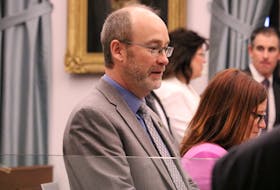
An emergency room doctor who expressed his opinions on Twitter about workloads at the Queen Elizabeth Hospital had the right to do so, says the president of the P.E.I. Medical Society.
In an interview with The Guardian, Dr. David Bannon said he didn’t really have any concerns about the doctor’s tweets because any confusion that arose was because of problems with context.
Bannon said the doctor was raising an issue he was passionate about and which was a legitimate issue.
“He’s trying to speak to the balance of how can you deliver emergency room care in an emergency room that’s overcrowded with non-emergency care,” he said.
“That’s a problem throughout the whole system and I think that’s very legitimate to get into.”
Bannon made the remarks in response to questions about recent Twitter posts from Dr. Trevor Jain, who works in the QEH emergency room. Jain raised concerns last week about a situation at the QEH involving a shortage of hospitalists, which led to ER doctors temporarily taking on extra patient loads.
Hospitalists are doctors who see patients who have been admitted to hospital, but don’t have a family physician who can care for them.
A doctor who was in a temporary position at the hospital quit over the situation in the ER.
The hospital refused to identify the doctor who quit, with a spokeswoman saying it was out of courtesy and respect for the physician’s privacy.
Attempts to reach Jain for comment have been unsuccessful, but he hasn’t backed down from his comments and in more recent Twitter posts said he has since been experiencing a difficult work environment.
“If you are going to advocate for your patients be prepared for the heat,” Jain said in another message on Twitter.
Although it can have a wide reach, Twitter has limitations and only allows a maximum of 140 characters in every message.
Bannon said that means it’s often hard for someone using Twitter to give all of the context that’s appropriate for people to make an informed judgment.
“Does that mean that Trevor (Jain) doesn’t have a right to his opinion? Absolutely not and he has a right to express it,” he said.
But Bannon also said guidelines that are evolving about social media use will have to address the issue of when are things said on Twitter appropriate.
“You have to be accountable. If you end up scaring people or presenting a wrong perception then you’ll need to be accountable for that,” he said.
As for the staffing issues at the QEH, Bannon said it wouldn’t be appropriate for him to comment, but he did say he didn’t think Jain presented a wrong perception about the situation at the hospital.
The P.E.I. Medical Socitey looks to the Canadian Medical Association for guidelines on social media use, which say that doctors need to look at whether what they are saying leads to better health care or impairs it, Bannon said.
He also said social media is an excellent tool to engage people in conversations about emerging issues in a rapid way.
“The problem is that the conversation can’t stop at Twitter. It has to move on to a more constructive, certainly a more in depth arena.”
Bannon said no one is sure how social media will fit into the whole toolbox of delivering care.
“It’s a bit like space. It’s unexplored territory,” he said.








